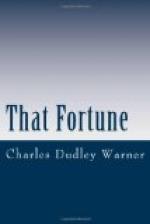Mr. Brad had a Socratic contempt for this sort of fault-finding. It was answer enough to say, “It pays. The people like it or they wouldn’t buy it. It commands the best talent in the market and can afford to pay for it; even clergymen like to appear in its columns—they say it’s a providential chance to reach the masses. And look at the “Morning GooGoo” (this was his nickname for one of the older dailies), it couldn’t pay its paper bills if it hadn’t such a small circulation.”
Mr. Brad, however, was not one of the editors, though the acceptance of an occasional short editorial, sufficiently piquant and impudent and vivid in language—to suit, had given him hopes. He was salaried, but under orders for special service, and was always in the hope that the execution of each new assignment would bring him into popular notice, which would mean an advance of position and pay.
Philip was impressed with the ready talent, the adaptable talent, and the facility of this accomplished journalist, and as their acquaintance improved he was let into many of the secrets of success in the profession.
“It isn’t an easy thing,” said Mr. Brad, “to cater to a public that gets tired of anything in about three days. But it is just as well satisfied with a contradiction as with the original statement. It calls both news. You have to watch out and see what the people want, and give it to ’em. It is something like the purveying of the manufacturers and the dry-goods jobber for the changing trade in fashions; only the newspaper has the advantage that it can turn a somersault every day and not have any useless stock left on hand.
“The public hasn’t any memory, or, if it has, this whirligig process destroys it. What it will not submit to is the lack of a daily surprise. Keep that in your mind and you can make a popular newspaper. Only,” continued Mr. Brad, reflectively, “you’ve got to hit a lot of different tastes.”




